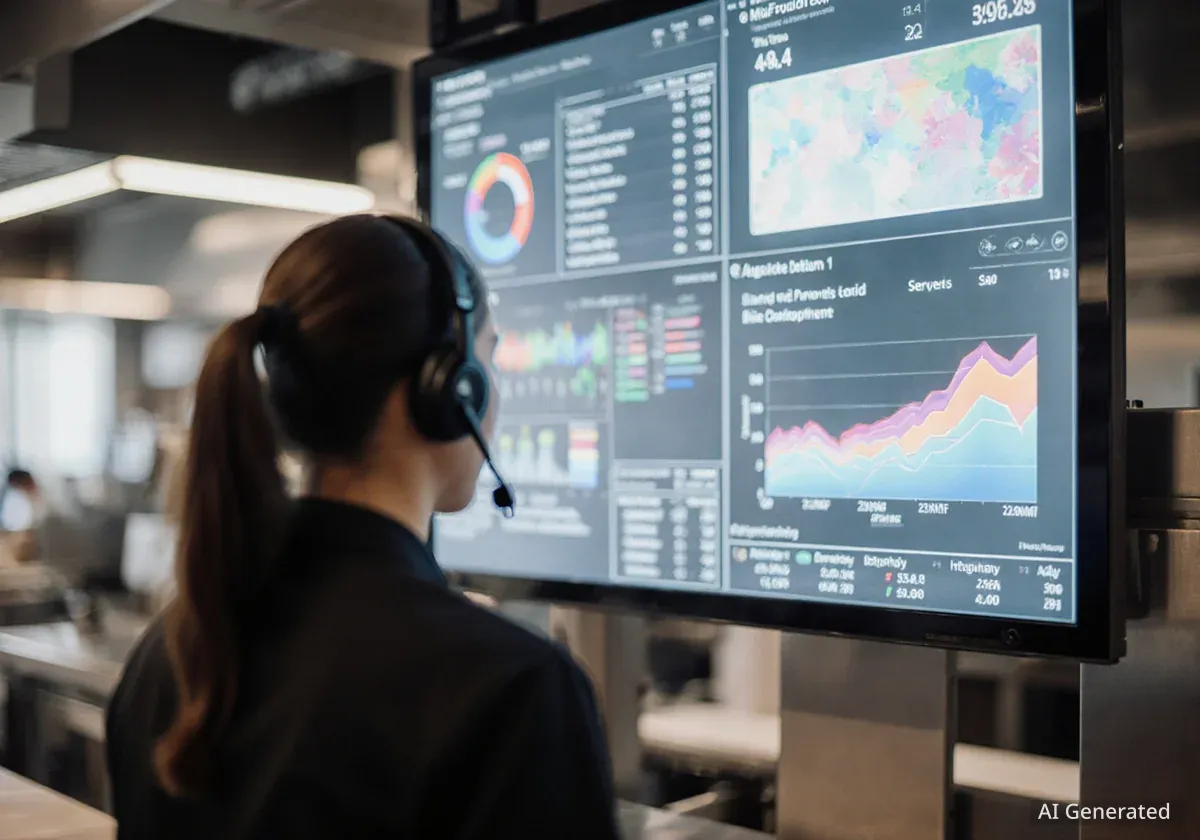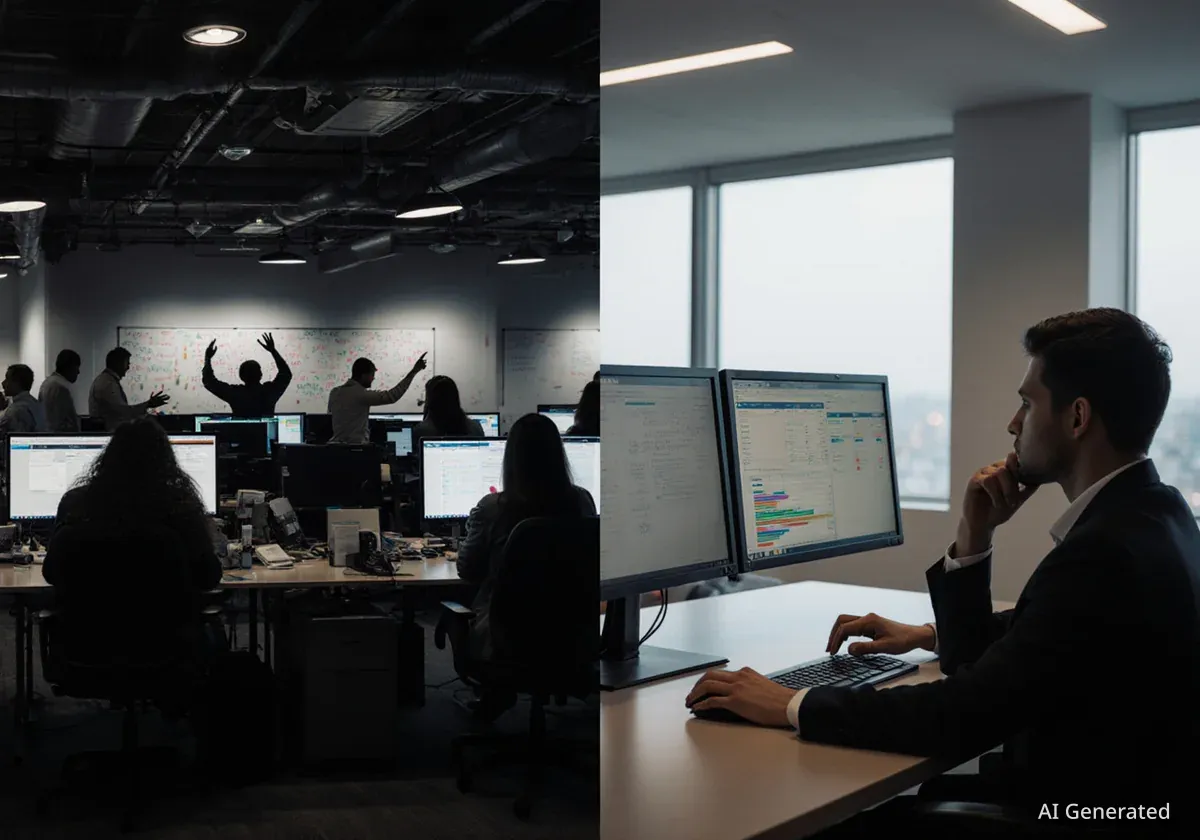Technicians in skilled trades such as plumbing and HVAC are increasingly using artificial intelligence to streamline daily operations. Companies are adopting tools like ChatGPT to automate administrative tasks, diagnose complex problems, and improve overall business efficiency, marking a significant technological shift in traditionally hands-on industries.
From generating invoices on-site to automating customer service, AI is becoming a standard part of the toolkit for many blue-collar professionals. This adoption is leading to measurable financial gains and productivity improvements, allowing businesses to handle more projects and enhance service quality without replacing the essential work of skilled technicians.
Key Takeaways
- Over 70% of tradespeople have experimented with AI tools, with 40% using them regularly in their work.
- Companies report significant revenue increases, with one Florida business seeing a $370,000 rise after implementing an AI marketing feature.
- AI is primarily used to automate administrative tasks like invoicing and customer communication, not to replace hands-on technical labor.
- Vocational schools are beginning to integrate AI into their curriculum to prepare future graduates for a tech-enabled workforce.
AI Integration in Daily Operations
For businesses like Oak Creek Plumbing & Remodeling in Wisconsin, artificial intelligence has become an essential tool. The company's team of approximately 20 plumbers now uses tablets equipped with ChatGPT to handle a variety of tasks that once required significant manual effort.
Dan Callies, the company's president, explained that employees can take photos of a malfunctioning water heater or describe a problem in a text prompt. The AI then generates a detailed list of recommendations, a work proposal, or a customer invoice. "It’s definitely been worth the investment," Callies said, noting that even veteran plumbers are impressed by the solutions the technology provides.
This integration extends beyond popular platforms like ChatGPT. Many businesses are using industry-specific software such as ServiceTitan and Housecall Pro, which have built-in AI capabilities designed for the trades. These tools affect both field operations and back-office administration, creating a more streamlined workflow from start to finish.
A Shift from Manuals to AI Diagnostics
At Gulfshore Air Conditioning & Heating in Florida, AI has completely automated the process from a customer's initial service request to a technician's arrival. Once on-site, technicians use AI to diagnose issues and access technical data instantly. This replaces the time-consuming task of searching through multiple, lengthy service manuals. According to Krista Landen, the company's marketing and IT manager, this allows for faster and more accurate service.
Widespread Adoption Across Trades
The use of AI is not limited to a few innovative companies. A recent survey conducted by Housecall Pro across North America provided clear data on this growing trend. The survey, which included over 400 tradespeople, revealed that more than 70% of respondents have tried AI tools, and approximately 40% are active users.
The study also highlighted demographic and industry-specific trends:
- Younger professionals are leading the adoption of AI technologies.
- Plumbers reported the most significant business growth attributed to AI.
- Cleaning services were identified as the biggest adopters of AI tools overall.
- Electricians expressed the highest satisfaction rates with the technology.
Preparing the Next Generation
Educational institutions are also adapting. Jason Altmire, CEO of Career Education Colleges and Universities, confirmed that vocational schools are incorporating AI into their programs. "They want their graduates ready for jobs that are going to be available in the future, not jobs that were here five years ago," Altmire stated. This collaboration between schools and employers ensures that new technicians enter the workforce with relevant skills.
Despite the positive momentum, some industry veterans remain cautious. Edward McFarlane of the Air Conditioning Contractors of America acknowledged some hesitancy but described the trend as inevitable. "I wouldn’t say they’re all in," he commented, "But the tide is definitely coming in."
The Economic Impact on Blue-Collar Businesses
The integration of AI is reshaping the financial landscape for many skilled trade businesses. By automating administrative duties, AI allows technicians to focus on their primary, hands-on work. Laura Ullrich, an economist at Indeed, noted that this shift helps workers concentrate on the aspects of their job they enjoy most, leading to smarter and more efficient work.
"People go into the trades because they like doing the hands-on work itself, and if some of the administrative tasks can be automated, then that should help those workers lean into the parts of the job they like and do smarter work," said Ullrich.
The financial benefits are tangible. Gulfshore Air Conditioning & Heating reported a $370,000 increase in revenue just 30 days after adopting an AI-powered marketing feature. The company also saw a $150 rise in revenue per average service ticket because technicians could complete administrative work faster and offer additional services to customers.
Krista Landen mentioned that sustained revenue growth should lead to better compensation for employees. "We should start to see more of a benefit in order to roll out new compensation packages (for technicians) within the next six months," she said.
The Future of Labor in Skilled Trades
While AI is transforming workflows, there is broad consensus that it is not on the verge of replacing skilled technicians. The technology currently serves as a powerful assistant, enhancing human capabilities rather than making them obsolete. The physical, problem-solving nature of trades like plumbing and HVAC requires human expertise that current robotics cannot replicate.
However, the growing adoption of AI may reduce the need for certain administrative roles within these companies. As AI takes over tasks like scheduling, marketing, and customer intake, businesses may be able to operate with a leaner office staff, thereby cutting overhead costs.
For technicians in the field, the primary effect has been positive. Landen of Gulfshore concluded that the technology has made her team more efficient and less stressed. "I feel like I am a real life Jetson living in the future," she remarked, highlighting the transformative impact of these new tools on the daily work experience.





